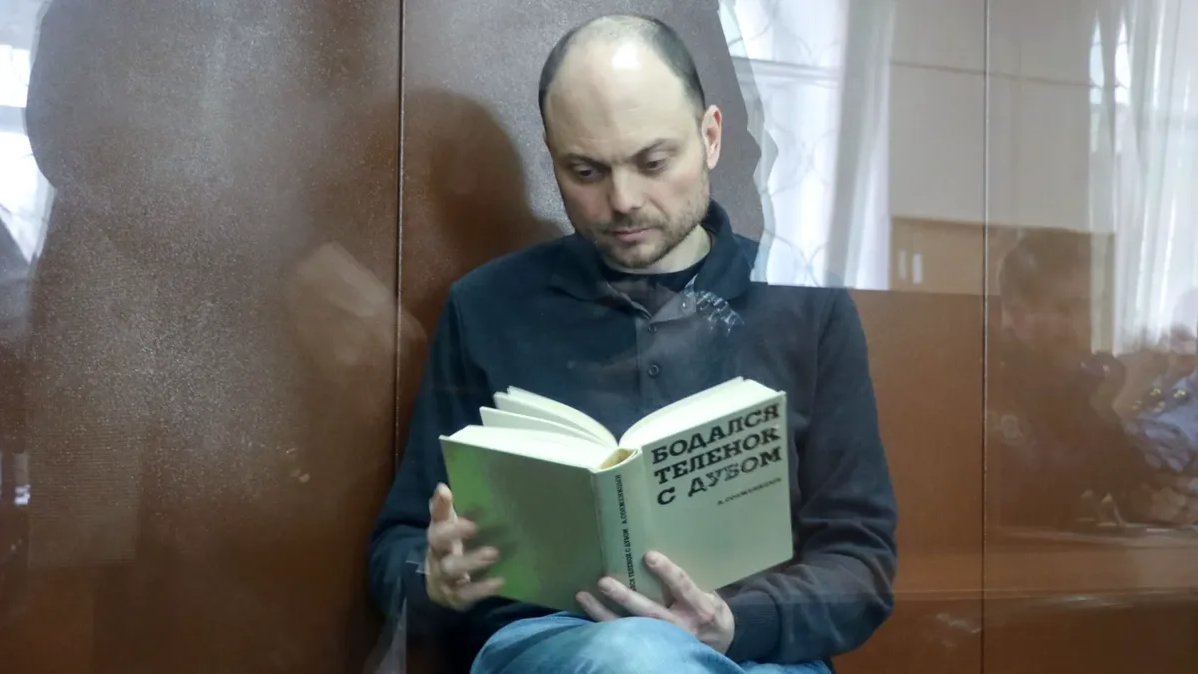Novaya Gazeta Europe presents a biography of Vladimir Kara-Murza Jr., a journalist and public figure who comes from a long line of historians. Last week, Russia’s state prosecution demanded that he be imprisoned for 25 years in a high-security prison. The verdict will be delivered by a judge who ended up on the Magnitsky Act thanks to the efforts of… Kara-Murza.
Foundation
Vladimir Kara-Murza was born into a family of respected historians with deep roots and rich heritage. This is where his surname, which is unusual for Russia, comes from, albeit with a few changes through the centuries. Kara-Murza is of Turkic origin and means “black prince”. Vladimir’s grandfather, Alexey Kara-Murza, was a historian and frontline journalist. He survived the Battle of Stalingrad and a forced labour camp before World War II. His great-grandfather, Sergey Kara-Murza, graduated from an Imperial university with a law degree, worked as a lawyer, a columnist, and even the chair of the Russian Society of Friends of the Book. His maternal great-grandfather, Latvian revolutionary Voldemārs Bisenieks, was executed at the height of the Great Purge. His great-great-uncle, Latvian diplomat and politician Georg Bisenieks, was accused of being involved in the assassination of Sergey Kirov and spying for Latvia and the UK in 1934. Also executed. Vladimir’s father, Vladimir Kara-Murza Sr., was a historian and a renowned journalist. In 2001, when Russia’s NTV TV channel famous for its scathing criticism of recently elected President Putin swapped hands to be overtaken by the Kremlin-imposed owners, Kara-Murza Sr. and some of his colleagues resigned in protest. Attempts to work in newly-created independent channels failed, with them getting shut down as well, which forced Kara-Murza Sr. to even work as a stoker in a boiler room for a while. However, Kara-Murza Sr. then returned to journalism for Radio Liberty and Echo of Moscow.
Vladimir Kara-Murza Jr. possibly had the most unorthodox education among all Russia’s modern politicians, including opposition ones. His parents signed Vladimir for a special French-oriented school whose teachers managed to stick to their liberal views even in Soviet times and taught free-thinking to their students as well as the ability to think critically and form their own opinions. Kara-Murza recalled that the school, his upbringing, and family roots influenced his future world outlook and views. He also has his school to thank for his personal life: he met his future wife Evgenia in fifth grade. After the school graduation, his parents sent their son to the UK to study in Trinity Hall, a constituent college of the University of Cambridge, where he obtained his masters in history.
Kara-Murza recalled how he was contemplating who to be in the future in a letter from prison written exclusively for Novaya-Europe:
“I am already a third-generation historian, and a fourth-generation journalist on top of that. What’s funny is that, and I remember it well, when the time was approaching to settle on the university and profession, I was telling myself that I’d become anyone but a historian or a journalist — enough of the generations! However, it seems like you can’t fight genetics. Of course, the historian background of my grandfather and father along with my own history education (history department in Cambridge) had a huge impact. I actually believe that history is the best education foundation for a politician or a journalist. Your horizons become broader, it helps you make decisions. But most importantly, it allows you to forecast what’s going to happen next and calculate consequences of certain actions (yours and others’). Because nothing new is happening in the grand scheme of things — it’s all been there already, albeit in different forms. And even though [Russian historian Vasily] Klyuchevsky said, ‘history doesn’t teach you anything, it only punishes you for failing to study its lessons’, you can still very much learn from it. Moreover, this education has a practical dimension for me: for example, my thesis in Cambridge was focused on the first (pre-revolution) State Duma, while one of my majors was the history of the dissident movement in the Soviet Union. The latter is especially relevant now.”
Kara-Murza, the journalist
While studying in the UK, Kara-Murza simultaneously made his first steps into the world of journalism. His first article, dedicated to fox hunting as the animals were freely roaming London like stray dogs, was published in a British newspaper. The young journalist urged to protect foxes rather than kill them.
He also wrote for Moscow’s Novye Izvestia, then worked as a columnist for Kommersant and even the editor-in-chief for Russian Investment Review. In 2004, he was offered to head the Washington bureau of RTVI. Vladimir was just as successful in the TV business as his father. He was the first to sit down for a televised interview with businessman Sergey Kolesnikov who revealed the existence of “Putin’s palace” on the Black Sea coast.
Up until his recent arrest, he wrote pieces for The Washington Post, The Wall Street Journal, the Financial Times, World Affairs, the National Post, The New Times, Novaya Gazeta, and Echo of Moscow.
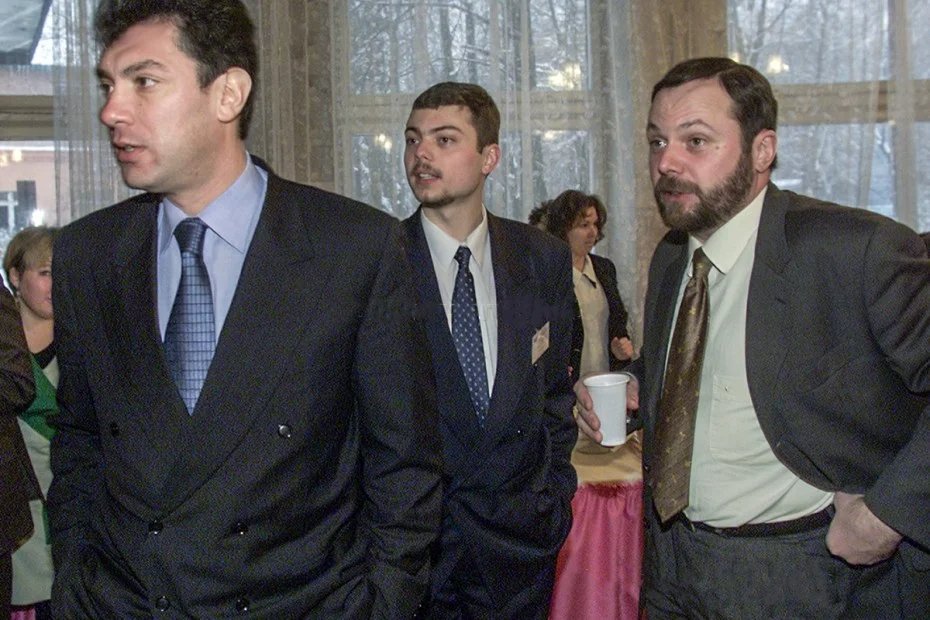
Boris Nemtsov, Vladimir Kara-Murza Jr., and Vladimir Kara-Murza Sr. Photo: Nemtsov Bridge
Kara-Murza, the politician
Kara-Murza also ventured into politics. By the time he was 18, he had already joined the right-wing liberal Democratic Choice of Russia party which soon disbanded. Most of its members, including Kara-Murza, then merged into a similar party called the Union of Right Forces. This was where he met Boris Nemtsov, at the time the chairman of the party’s faction in the State Duma (lower house of Russia’s parliament), who had already served as governor of the Nizhny Novgorod region (setting a record as the youngest governor under Boris Yeltsin, the first president of Russia), as well as being a member of the upper house of parliament, the national Security Council, and working in the government. Kara-Murza’s meeting with Nemtsov would prove to be a fateful one.
In 2003, when Vladimir Putin had been in power for three years already, Kara-Murza attempted to secure a seat in the lower house for the first time. However, his opponent Vladimir Gruzdev from the ruling United Russia party attempted to disqualify him during the electoral campaign. Moreover, the voting day saw classic ballot fraud in Kara-Murza’s district. Needless to say, Kara-Murza did not make it.
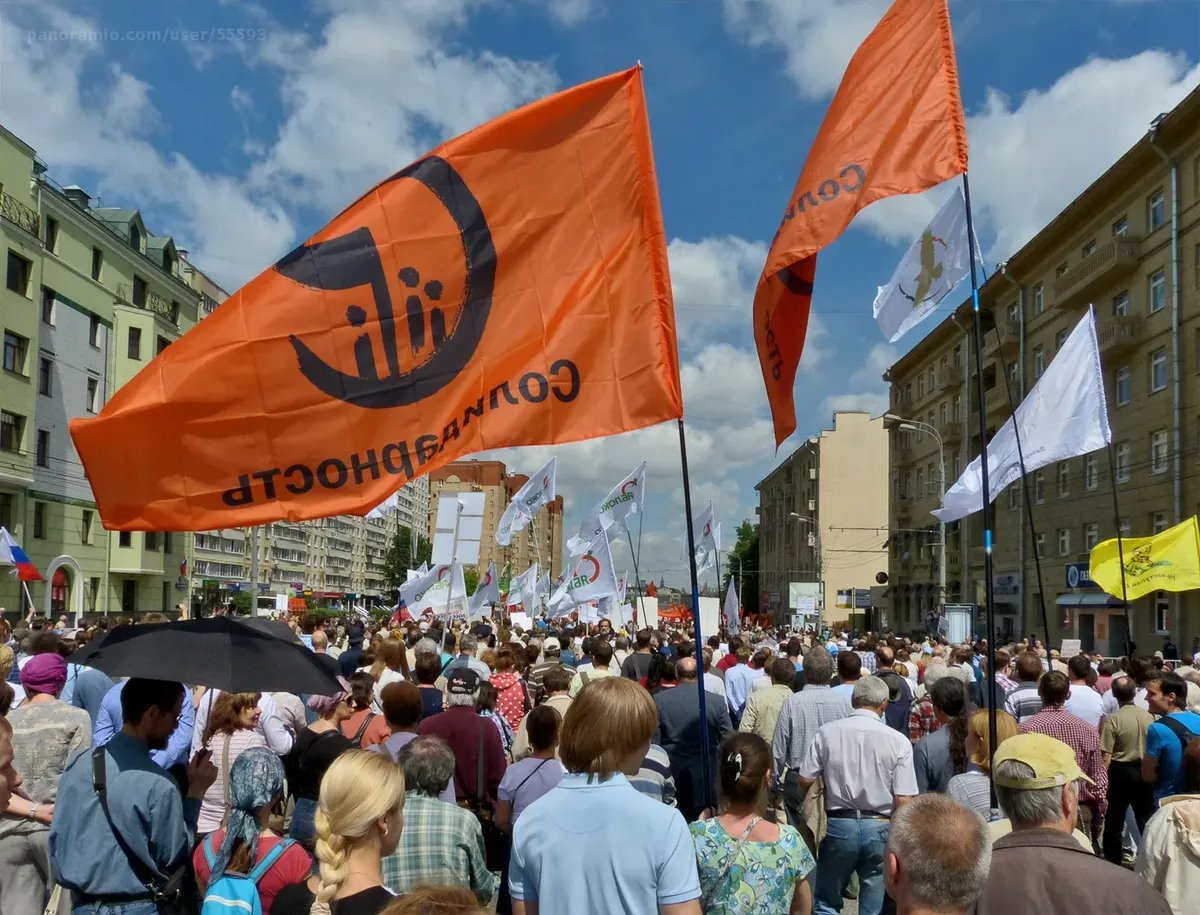
Flags of the Solidarity movement at the For Your Freedom and Ours march also called a March against Executioners. Moscow, 12 June 2013. Photo: Wikimedia Commons, CC BY-SA 3.0
Several months later, he joined forces with Nemtsov, former chess world champion Garry Kasparov, politicians Vladimir Ryzhkov, Irina Khakamada, and other members of opposition and intellectuals to form Committee-2008: Free Choice. The committee sought to organise “free and democratic” presidential elections in 2008. The organisation, however, soon found itself embroiled in internal disagreements over creating a unified democratic party. They failed to reach a compromise. The committee fell apart.
The Union of Right Forces, Kara-Murza’s political party, soon collapsed and merged with Right Cause, a Kremlin project. Nemtsov and Kara-Murza resigned in protest. Nemtsov created the Solidarity movement, modelled after Poland’s Solidarity. Kara-Murza became its leading member.
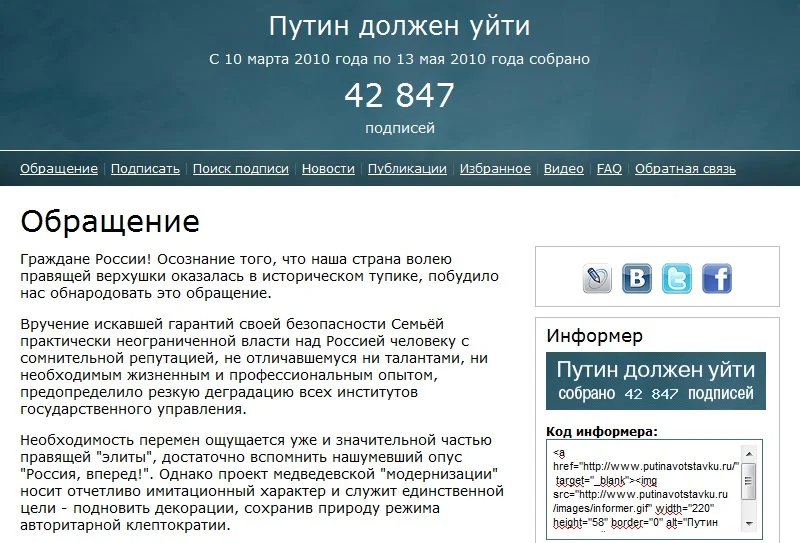
Screenshot of a website calling on Putin to resign. Photo: Wikimedia Commons
In 2010, Kara-Murza, Nemtsov, and other opposition forces co-authored an appeal entitled “Putin must go” which was open for signatures by anyone on a dedicated website. The appeal read, “At the heart of the social and political structure that is destroying Russia, and which is currently being imposed on the citizens of our country, there is one individual who acts as both the architect, the curator, and the protector. His name is Vladimir Putin.”
“We believe that no essential reforms are possible in Russia as long as Putin has any real power in the country. Eradicating Putinism is the first but necessary step on the way to a new and free Russia.”
The appeal listed the reforms of the Putin era that, the authors believed, failed (“everything that could fail failed”) and referred to the events such as the Second Chechen War and residential building explosions in Russian cities.
The appeal garnered more than 150,000 signatures. Nonetheless, Putin never stepped down. Moreover, he unleashed a new war on the 23rd year of being in power — against Ukraine. By then, Nemtsov will have already been killed. Meanwhile, Kara-Murza will have been placed in a detention centre, among other things, for openly criticising this war.
Support independent journalism
Magnitsky Act
On 16 November 2009, Russian tax advisor Sergey Magnitsky who worked for Firestone Duncan, a small law firm, died in a Moscow detention facility. His colleagues then published information that shortly before his arrest Magnitsky discovered large-scale schemes organised by Russian officials and security forces to embezzle public funds via illegal tax returns. However, instead of opening a criminal case against certain people, the investigation placed Magnitsky into custody and accused him of being an accomplice in tax evasion. At the same time, his case was investigated by the very people the tax advisor had accused of corruption. While under arrest, Magnitsky repeatedly complained about his poor health but was never granted a proper checkup or medical care. Moreover, members of an independent human rights supervisory commission concluded that Magnitsky was battered with batons several minutes prior to his death.
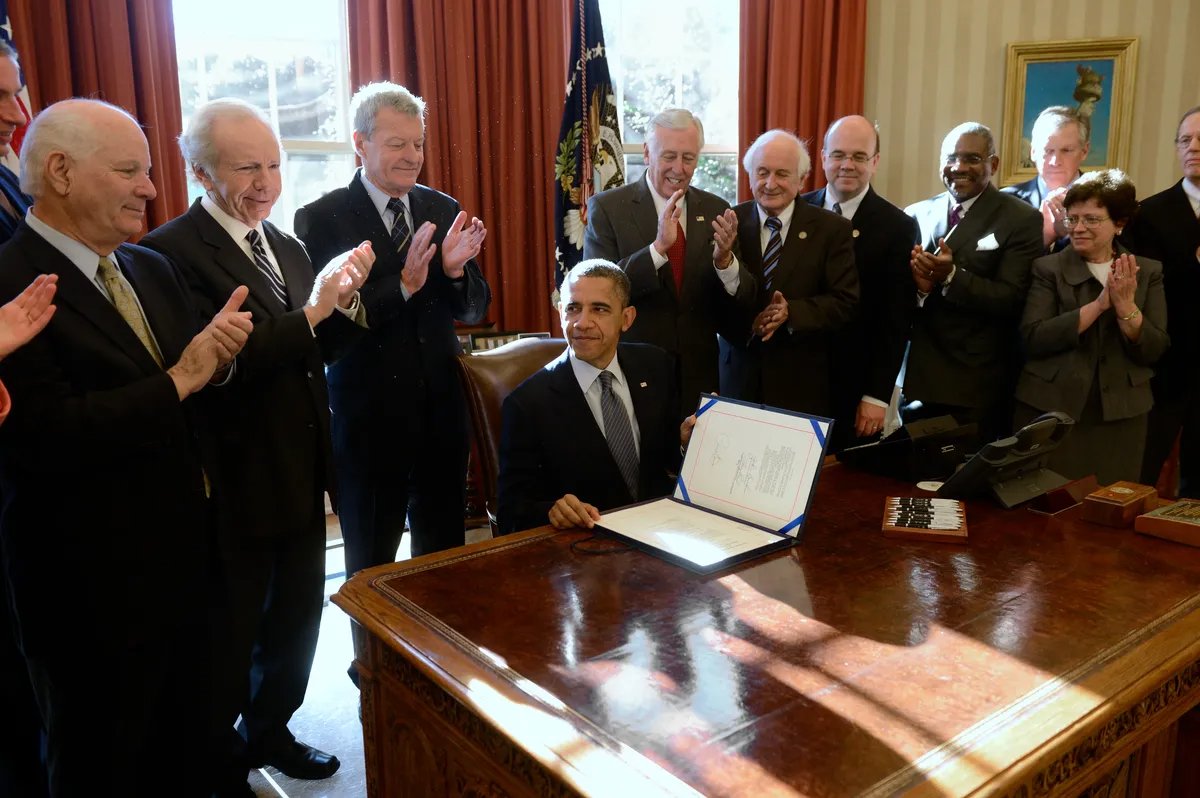
Barack Obama signs the Magnitsky Act. US, Washington, 14 December 2012. Photo: EPA/MICHAEL REYNOLDS
The lawyer’s death caused international uproar and brought about the Magnitsky Act in the US and later in Canada which introduced individual sanctions against Russian officials involved in human rights violations. The targeted people were banned from entering the US and had their assets frozen.
Key lobbyists of this act on behalf of the Russian opposition in the US Congress were Boris Nemtsov and Vladimir Kara-Murza. They invented the first-of-its-kind bill that outlined the possibility of targeted punishment for those violating basic human rights through sanctions. Such a mechanism simply did not exist before the Magnitsky Act.
Economic sanctions were generally imposed against the whole country like it happened with Iraq, Libya, Iran, Cuba, Syria, and North Korea… The Magnitsky Act made it possible to punish people personally. However, it proved to be a much too painful blow to the feeling of complete impunity among the Russian power block and officials.
Separately, Kara-Murza, who at the time was living in the US with his family, achieved the inclusion of references to violations of the rights to freedom of “expression, association, and assembly, and the right to a fair trial and democratic elections” in the final text of the bill.
This is how he ceased to be a journalist.
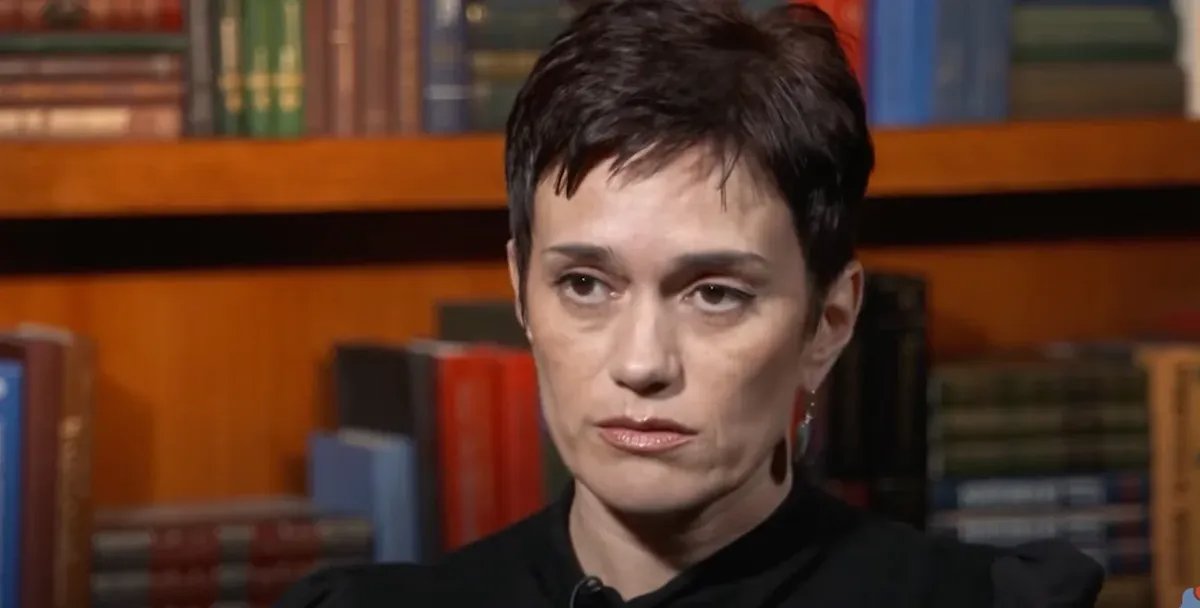
Evgenia Kara-Murza. Photo: video screenshot
This is the recollection of those events by his wife Evgenia Kara-Murza:
“Journalism should be objective, as objective as possible. Being a journalist, Vladimir always stuck to this principle but realised at some point that he could no longer restrict himself like that. He could no longer talk objectively about what was happening. He did not just have an opinion on those matters, he wanted to change the situation. And I think that it all started with that Magnitsky Act campaign in 2010. When Boris Nemtsov invited him to take part in the campaign, Vladimir naturally agreed because he and Nemtsov alike understood that this tool — the Magnitsky Act — would be a revolutionary one if they could get it approved. And they were both right. This is a truly transformative instrument.”
Kara-Murza was fired from RTVI in the summer of 2012. His journalist accreditation in the US was soon cancelled at the behest of Russian Ambassador to the US Sergey Kislyak. The Russian Embassy’s press secretary Yevgeny Khorishko defended the move, saying that Kara-Murza was “no longer a journalist”.
Nemtsov then discovered that the decision to sack Kara-Murza was made personally by first deputy head of Putin’s administration Alexey Gromov. Gromov also warned all Russian media outlets not to hire Kara-Murza to avoid troubles. Kara-Murza himself also confirmed that he had been blacklisted: “Every single top media manager that I spoke to (some of them were still offering me work up until recently) politely said that no cooperation is possible as of now. They cited different reasons. Only one of them hinted at certain ‘baggage’ attached to my name.”
Both Kara-Murza and Nemtsov linked these developments to their active involvement in the Magnitsky Act.
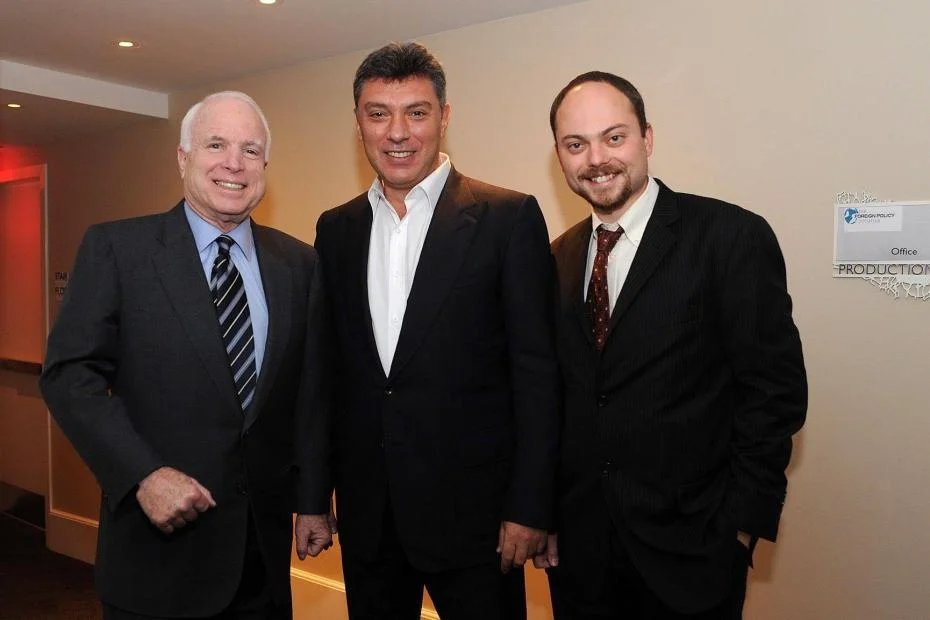
Vladimir Kara-Murza, Boris Nemtsov, and John McCain. Photo: Nemtsov Bridge
Nemtsov’s assassination, Kara-Murza’s poisoning
February, 2015. Nemtsov was shot in the back and killed on a bridge near the Kremlin. Those who ordered and organised the assassination are still not found eight years later even though his family’s lawyers have repeatedly pointed to the involvement of Chechnya’s top officials, including Chechen leader Ramzan Kadyrov’s entourage.
“To say that Boris had an impact on my life is a huge understatement. I just would not be who I am today; I would not have done many of the things I have done in my life if it wasn’t for him,” Vladimir Kara-Murza writes to Novaya Gazeta Europe today from prison. “I met him when I was 18, during the 1999 State Duma election campaign. That’s when I started working with him. We then walked side by side through all those years, until the very end. We’ve been through it all: elections, protests, working in democratic parties and movements, legal parliamentary politics (I was his advisor in the third convocation of the State Duma), ‘non-systemic’ opposition, almost dissidence; we jointly advocated for (and secured) the Magnitsky Act in the US… I am grateful for every day in those 15 years that I was fortunate to spend with him. Boris is not just my close associate, he is my mentor, teacher, friend, and also the godfather of my younger daughter. The main thing he taught me (by setting a personal example, the only way something can be taught) is that politics can only be done with clean hands. Nemtsov understood politics just like Václav Havel — as ‘morality in practice’. He always said what he thought. He did what he promised. He never betrayed his beliefs or friends. He always did what he thought was right, and not what was rewarding, easy, or convenient. That’s possibly why his main quality was a true love for people. This is what Russia’s politics so severely lacks nowadays. That and Boris.”
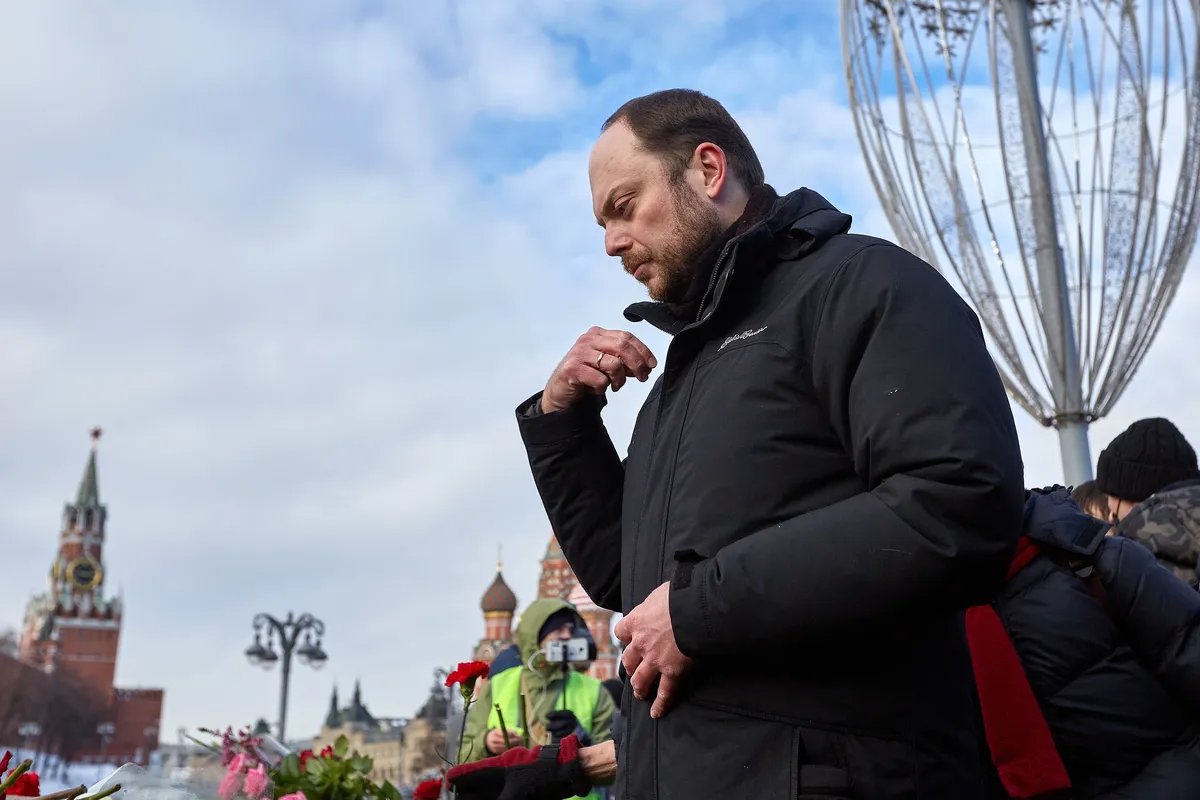
Vladimir Kara-Murza at the Boris Nemtsov memorial. Photo: Mihail Siergiejevicz / SOPA Imag via Reuters Connect
Four months after Nemtsov’s assassination, Vladimir Kara-Murza suddenly fainted during a workday in Moscow in May 2015. At the time he was already working for Mikhail Khodorkovsky as a coordinator of Open Russia, an organisation that has now been declared “undesirable” in the country. He suddenly felt unwell while speaking to his colleagues. His heartbeat accelerated dramatically which was followed by vomiting. He practically could not move by the time an ambulance arrived. Doctors initially suspected a heart attack and started preparing him for a surgery later that evening. It could have all ended badly had famous cardiac surgeon Mikhail Alshibaya not intervened. According to Kara-Murza’s lawyer Vadim Prokhorov, Alshibaya checked Vladimir and said:
“What are you doing? The heart is ok, he’s been poisoned!!”
The surgery was off the table. Kara-Murza was sent to the ICU. By that time, his lungs, heart, kidneys, and liver were already failing. The treatment was administered under the supervision of Moscow’s chief intensive care physician Denis Protsenko. Kara-Murza was hooked to eight life support machines at some point. He was transferred to the US only a month later to undergo six months of rehabilitation therapy with his family.
Tests run by a French laboratory on Kara-Murza’s samples revealed a significant excess of heavy metals in his body. Meanwhile, a forensic examination in Russia did not confirm that he had been poisoned. The national Investigative Committee refused to intitate a criminal case on attempted murder.
Following his recovery, Kara-Murza continued to fly back to Russia. He now needed a cane to walk. He served as the chair of the Nemtsov Foundation (created by Nemtsov’s daughter) for a while, shot a documentary about his friend titled Nemtsov, and travelled across the country for its screenings.
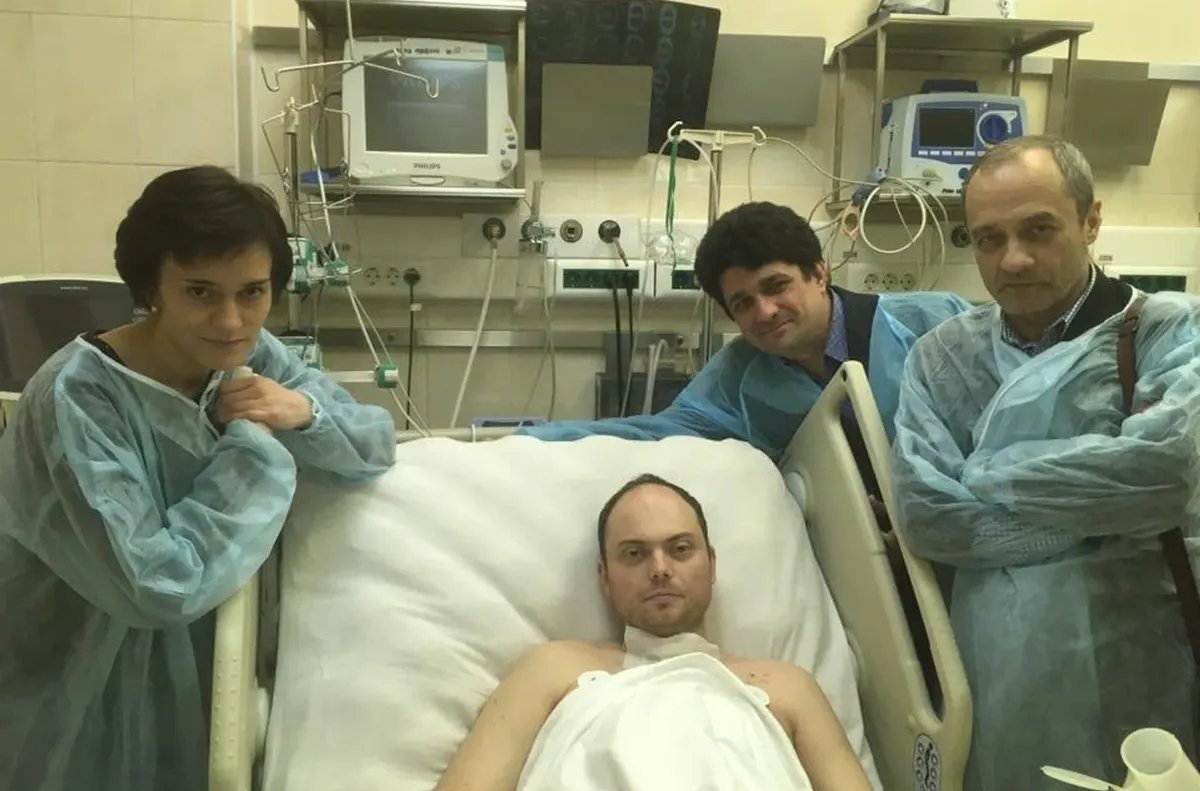
Vladimir Kara-Murza after poisoning. Photo: Facebook
Soon after his trip to Kazan in February 2017, Kara-Murza was rushed to hospital in critical condition with the same poisoning symptoms. Denis Protsenko at the time headed the hospital. He saved Kara-Murza in 2015 and saved him this time again. Kara-Murza’s blood, hair and nail samples were sent to France, the US, and Israel for toxicology tests. Kara-Murza then said that these tests pointed to another poisoning.
Investigative journalism group Bellingcat later published data on movements of FSB officers which showed that they followed the same route as Kara-Murza. The journalists discovered that both cases when he ended up in hospital with signs of poisoning were preceded by trips where he was covertly accompanied by security agents. Moreover, Alexander Samofal accompanied Kara-Murza on all his trips prior to the first poisoning. Samofal was previously registered at the address of military unit 2567 — the location of the Golitsyn Border Guard Institute of the FSB.
Prior to the second poisoning, Kara-Murza was again unofficially accompanied by Alexander Samofal and Valery Sukharev, both FSB officers, as well as the alleged participant in Navalny’s poisoning, Konstantin Kudryavtsev, on trips to various Russian regions.
The FBI received results of the test run on Kara-Murza’s samples but classified them for some undisclosed reason. The politician even tried to sue the bureau but only managed to get them to reveal fragments of his case: some pages remained confidential due to “national security concerns”. The disclosed parts spoke about a “premeditated poisoning” but did not name the poisoning agent.
On the eve of the war
Between his last poisoning and the recent arrest, Kara-Murza worked as the vice president of the Free Russia Foundation (now also declared “undesirable”) and shot a documentary titled My Duty to Not Stay Silent about one of the most liberal priests in the Russian Orthodox Church Georgy Edelshteyn. He was from a small village in the Kostroma region. In the 1990s, Edelshteyn publicly called on the church heads to repent for cooperating with God-denying Soviet authorities and the KGB. Moreover, Edelshteyn was one of the few church priests who defended Pussy Riot members for their church performance and criticised Patriarch Kirill for working with the Kremlin.
Kara-Murza once again embarked on a tour around Russian cities for screenings and open discussions. He filed a lawsuit against the Investigative Committee after the agency still refused to initiate a criminal case on his poisoning. The politician hosted the Week’s Borders programme on Echo of Moscow which he inherited from his late father (Vladimir Kara-Murza Sr. passed away in the summer of 2019 after a long battle with illness).
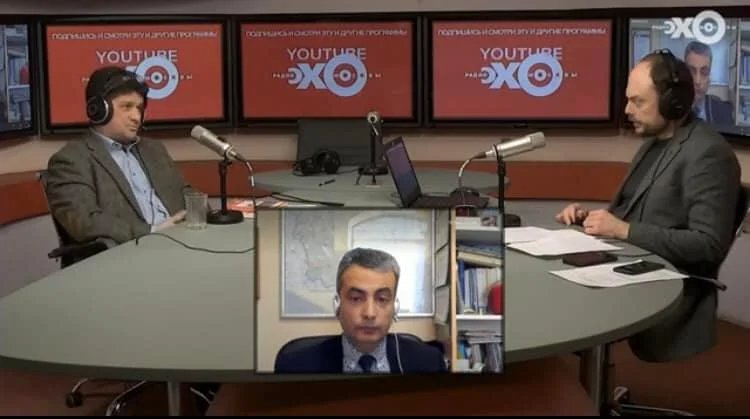
Vadim Prokhorov, Lev Shlosberg, and Vladimir Kara-Murza on air for Echo of Moscow. Photo: video screenshot
The atmosphere in the country ahead of 24 February 2022 was as follows: Alexey Navalny, who was poisoned with Novichok but miraculously survived, returned to Russia and was serving prison time, ex-Director of Open Russia Andrey Pivovarov who attempted to escape Russia was arrested, the oldest human rights organisation Memorial — the last place in the country that kept memories of Stalin’s terror alive — was shut down…
War and arrest
After Russia invaded Ukraine, Kara-Murza joined the Russian Anti-War Committee, a group set up by Russian politicians, businessmen, and scientists to collect humanitarian aid for Ukraine and help people who fled Russia. The committee members were particularly calling on the international community to declare Russia’s political leadership war criminals responsible for unleashing the war on Ukraine.
On 15 March, Kara-Murza was in the US and delivered a speech in Arizona’s House of Representatives. He spoke about “Putin’s regime” and “dropping bombs on residential quarters, hospitals, and schools” in Ukraine. On 4 April, he took part in the PACE sessions, telling parliamentarians about Russia’s political prisoners and mentioning the war once again. He then returned to Moscow as if nothing happened. At the same time, he was fully aware that the Kremlin was cracking down on dissent with new repressive measures, with people getting prison sentences.
Evgenia Kara-Murza recalls:
“In early March 2022, I asked him to come home [to the US] for a few days because our eldest daughter had turned 16. He did come to celebrate her birthday and then flew back. Vladimir and I had stopped talking about whether he should be going back to Russia by that point. Generally, it has been clear since 2015 that he is not just facing a potential prison term. There is a very real threat to his life. And still, as soon as he was able to get on his feet in 2015 he took his cane and hobbled towards Moscow. He did the same after 2017, and continued doing so time after time. Vladimir always said that the biggest gift for the current authorities would be if everyone who opposed them would just pack their bags and leave. Vladimir always says that he would not give them this gift because he is a true patriot.”
On 11 April 2022, he was first arrested under an administrative case procedure: 15 days for allegedly “failing to comply with a police officer’s orders”. He was detained in the courtyard of his own house, where an unmarked minibus had been waiting for him for several hours. The police report reads that Kara-Murza “saw police officers, changed the trajectory of movement, started walking faster, and attempted to flee the scene when he was told to stop”.
However, Kara-Murza did not end up spending 15 days at the detention centre — a criminal case was opened against him for “spreading fakes about the Russian army motivated by political hatred”. His speech in Arizona was cited as the reason. He was first brought to the Investigative Committee for questioning followed by a court hearing, arrest, and a detention facility. On top of that, the Russian Justice Ministry labelled him as a “foreign agent” a few days later.
Fast forward four months when Kara-Murza was charged with another offence: “running an undesirable organisation”. He allegedly used the Free Russia Foundation money to host a conference in support of Russian political prisoners in Moscow’s Sakharov Centre in the autumn of 2021. However, Kara-Murza resigned from his vice president position in the foundation several months ahead of the conference to continue working in Russia. The law says that voluntary termination of contracts with an “undesirable organisation” exempts people from criminal liability. Not in Kara-Murza’s case, evidently.
Finally, the worst charge came in October 2022: high treason for “providing help to organisations from NATO countries aimed against Russia’s security”. The authorities possibly meant his contribution to the Magnitsky Act…
The court hearing was held behind closed doors. Sergey Podoprigorov, the presiding judge, ironically, is one of the people on the Magnitsky Act list. So, defendant Kara-Murza was pushing to add the person who would later decide his fate to the sanctions list. Well, the irony doesn’t end here because the detention facility where Kara-Murza is held is headed by another person mentioned in the Magnitsky Act — Dmitry Komnov, ex-head of the detention centre where Sergey Magnitsky was left to die back in 2009.
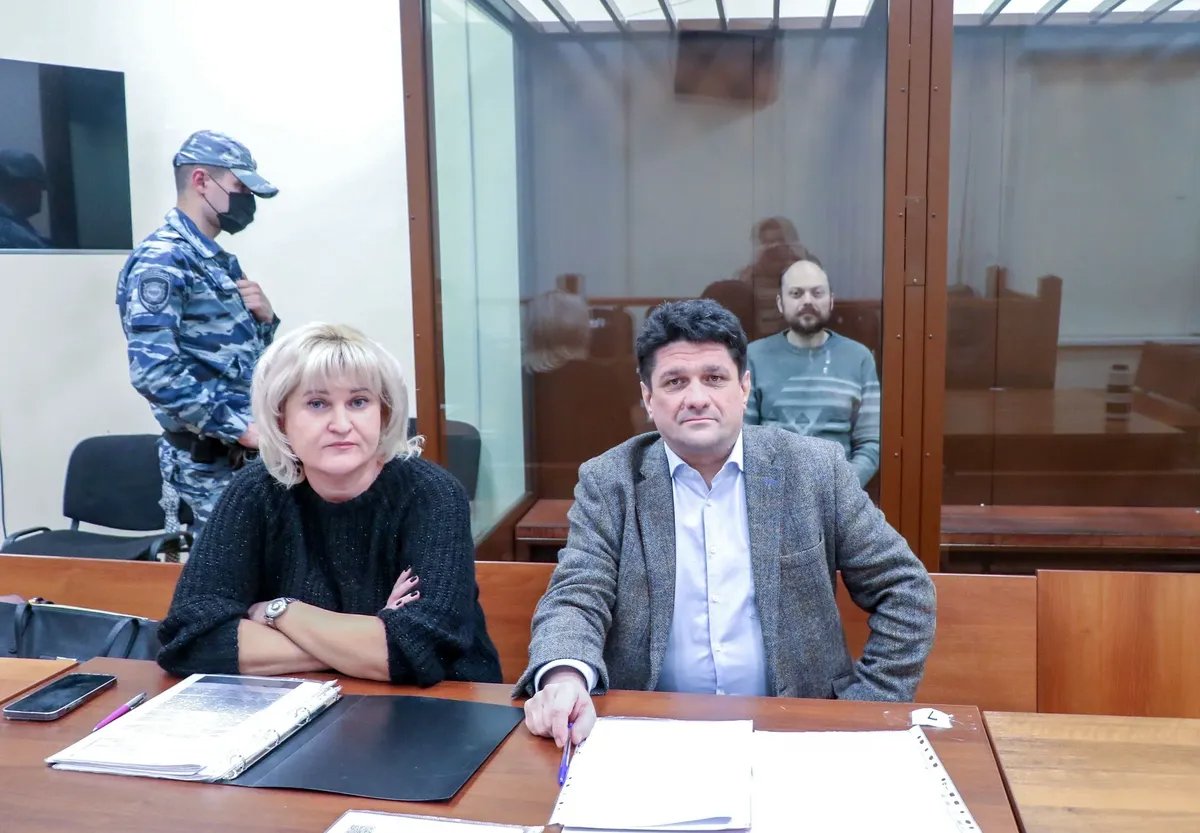
Vladimir Kara-Murza with Olga Mikhaylova and Vadim Prokhorov at a court hearing. Photo: Facebook
Prosecutor Boris Loktionov would say ethically bizarre things before the court. For instance, he once took out a picture of late Boris Nemtsov at a rally in Moscow from the case material pile. The politician had his arm raised, which allowed the prosecutor to comment that Nemtsov was allegedly recreating the “Nazi salute”.
“You should be ashamed of yourself!” Kara-Murza burst out in indignation.
“Don’t speak from your seat without authorization!” Judge Podoprigorov reprimanded the politician.
This judge also refused to sanction a medical examination for the defendant after his health deteriorated. Kara-Murza, a survivor of two poisoning attempts, started losing sensation in his limbs. The detention centre doctors diagnosed him with polyneuropathy, a condition that, incidentally, is on the list of diseases that prevent people from serving their sentences. Doctors even refused to let Kara-Murza attend hearings a few times.
In early April, prosecutor Loktionov demanded 25 years behind bars in a high-security prison for the politician. At the same time, he described Kara-Murza as an “enemy of the people”.
“Alas, our family has a very typical story for the Soviet era,” Kara-Murza wrote to conclude his letter for Novaya-Europe. “Two great-grandfathers, well, a great-grandfather and a great-great uncle, executed by firing squads, a grandfather survived the Gulag system. Of course, all under the ‘enemy of workers' articles. Of course, all were rehabilitated later due to the lack of evidence. A few years ago, I visited archives to read through their cases. Possibly the most horrifying document I’ve ever seen was my great-grandfather’s execution report. A small piece of paper, a third of an A4 sheet. The executioner’s signature, name, and date. Like an excerpt from a fee accounting book. A person’s life. Meanwhile, my grandfather, Alexey Kara-Murza, survived forced labour camps and then the whole [Second World] War. He was arrested in 1937 for “speaking in animosity about the heads of party and government”. He was imprisoned in a Taganka Prison and then in AMURLAG and BAMLAG (Amur Railroad Corrective Labor Camp and Baikal Amur Corrective Labor Camp — translator’s note) where he was building the Baikal–Amur Mainline with other convicts. The only thing he shared with his family about the imprisonment was about the red rail tracks. In spring, when the sun came out, the mainline’s tracks turned bright red from the bedbugs who had more than enough to eat and crawled out of the barracks to get some sun. He never said anything else. People who survived camps do not like to go back there even in their thoughts, it’s a well known thing. So, my grandmother (she is much younger than him, she is 90 now), learnt everything from me when I read his case in the archives. So, when I was arrested last spring, she called my lawyer Vadim Prokhorov and said: ‘The country is going round in circles. My grandson is imprisoned under the same article as my husband.’
“This is to refer back to the failure to learn history’s lessons.
“I am certain that my verdict will be as bad as it can be. I realised it when I saw people in black masks running after my car in my house’s courtyard on 11 April 2022. This is a show trial. And the result should also be emblematic.
“But I also know that the verdict will have little to do with reality. Political prisoners do not serve their time under formal prison sentences but depending on the political situation. And in our country it has a tendency to change and change unexpectedly.”
Join us in rebuilding Novaya Gazeta Europe
The Russian government has banned independent media. We were forced to leave our country in order to keep doing our job, telling our readers about what is going on Russia, Ukraine and Europe.
We will continue fighting against warfare and dictatorship. We believe that freedom of speech is the most efficient antidote against tyranny. Support us financially to help us fight for peace and freedom.
By clicking the Support button, you agree to the processing of your personal data.
To cancel a regular donation, please write to [email protected]
